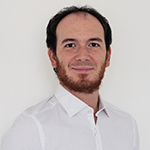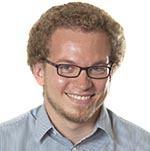Professor Sarah Smith, Head of Economics, welcomes everyone to the newly formed School of Economics at the start of this academic year.
"This is a very unusual time for everyone but it’s also exciting to welcome new students and staff at the start of the academic year – and the launch of the School of Economics. We look forward to working with you."
We would like to introduce the following new academic appointments:
Charlie Meyrick,Economics Observatory Manager |
 |
“After finishing my BSc in Economics and Mathematics, I then completed a master’s in International Development. My main interests include the economics of developing countries, environmental policy and the growing power and influence of Big Tech firms. I am also interested in the intersection between journalism, academia and public understanding of economic policy. This year I will be joining the Economics Observatory team, helping to manage the website on a day-to-day basis.”
Danielle Guizzo, Senior Lecturer |
 |
Danielle is joining the School as Senior Lecturer in Economics. She has expertise on political economy, history of economics and economics education, and is currently working on projects that explore educational policy, the impacts of assessment frameworks in economics, and diversity in the economics curriculum.
Emil Sørensen, Research Associate |
 |
Emil is an economist from University of Southern Denmark. He received his PhD in economics in 2020 and has recently joined the school as a Research Associate. He will work on gene-environment interactions in Professor Stephanie von Hinke’s group. His main research interests are genetics and machine learning, and how these fields can be combined with economics.
Hakki Yazici, Professor of Economics |
 |
Hakki is an economist whose research interests lie at the intersection of macroeconomics and public economics. He received his PhD from the University of Minnesota in 2009. Prior to joining University of Bristol, he worked as a faculty member at Sabanci University, Istanbul.
He is also a research fellow at CESifo. His work has been published in top economics journals such as the Review of Economic Studies, Journal of Monetary Economics and the Economic Journal. His current research focuses on economic inequalities and redistributive government policies.
Iacopo Morchio, Lecturer in Economics |
 |
“I obtained my PhD from the University Carlos III of Madrid; before coming to Bristol, I have worked at the University of Vienna. My main areas of interest are Labour Economics and Macroeconomics; I am particularly interested in the sources of economic inequality and their aggregate implications.”
Kevin Tran, Lecturer in Economics |
 |
Kevin studied at Humboldt-Universität zu Berlin and obtained his Ph.D. at Technische Universität Berlin, in a joint program with DIW Berlin and Berlin School of Economics. During his Ph.D. studies, he has also spent time at the EBRD in London as well as at the University of California at Berkeley. In his research, he is mostly interested in digital economics, empirical industrial organisation, and behavioural economics.
Matan Tsur, Lecturer in Economics |
 |
Matan joined the School of Economics in September 2020. Before joining Bristol, he was an Assistant Professor at the University of Vienna. Matan’s research is in economic theory; he has worked on models of search and matching, the economics of information and information design, dynamic contracts in competitive insurance markets, the optimal design of financial securities, and decision theory. His research focuses on economic questions, rather than theoretical problems, but some of the work also makes technical contributions.
Matan earned a B.Sc. in Mathematics and Economics at the Hebrew University of Jerusalem in 2006, and a Ph.D. in Economics at New York University in 2013.
Monica Costa-Dias, Professor of Economics |
 |
Monica Costa-Dias is Professor of Economics at the University of Bristol and Deputy Research Director at the Institute for Fiscal Studies. She is also a Research Fellow at IZA, CEPR and the Human Capital and Economic Opportunity Working Group. She is currently managing co-Editor of Fiscal Studies.
Her main research interests are in the fields of labour and applied microeconomics and her work focuses on the lifetime drivers of poverty and inequality and the role of public policy in reducing economic deprivation and its long-term effects. In particular, she studies the formation of skills over the course of life, from early childhood into the adult life, how they relate to individual background, circumstances, traits and the choices individuals make over time, and how in turn they affect the employment, earnings, career progression and economic wellbeing of workers.
Nicolai Vitt, Research Associate |
 |
Nicolai has previously studied for a PhD in Economics at the University of Edinburgh and has worked as a research associate at the European University Institute (Florence, Italy). He holds an MSc degree in Economics from the University of Edinburgh and BSc degrees in Economics and Business Administration from Philipps-University Marburg (Germany).
Nicolai’s research is in applied microeconometrics and behavioural economics, with a particular interest in health economics. In his previous research, he has studied how economic uncertainty and psychological factors, such as feelings of stress or failure, affect individuals’ behaviours and choices, particularly in the context of dietary and economic decisions. At Bristol, he will work on the ERC-funded project “Developmental Origins: exploring the Nature-Nurture Interplay” led by Professor Stephanie von Hinke.
Peter Spittal, Lecturer of Economics |
 |
“I am an applied microeconomist, with interests in labour and public economics. My research has focused on whether people are aware of features of the welfare system and how this affects their decisions about how much to work, save and consume. I am also interested in broader questions in labour economics, such as how wealth inequality affects occupational choice and, more recently, the labour market impacts of Covid-19. I received my PhD in economics from UCL and hold BA and MPhil degrees in economics from the University of Cambridge.”
Richard Davies,Chair in the Public Understanding of Economics |
 |
Richard joins the School as the UK’s first Professor in the Public Understanding of Economics. This new post has been created to help address the gap in understanding of economics. As a former journalist, economist for the Bank of England, advisor to the Chancellor and author, Richard has extensive experience in communicating economics to public and policy audiences.
Santiago Oliveros, Professor of Economics |
 |
“I am an applied Game Theorist with strong interests in Political Economy and Information Economics. My work has been published in journals like American Economic Review, Econometrica, Economic Journal and Journal of Economic Theory. I am currently working on public good contributions games and the role of information in decision making. I obtained my PhD in economics from the University of Wisconsin, Madison, in 2006.
Before joining Bristol, I had been Assistant Professor at the Haas Business School (University of California, Berkeley), Reader in Economics at Royal Holloway (University of London), and Reader in Economics at the University of Essex. In those institutions I have taught undergrad, MBA, MA, MSc, and PhD students, in microeconomics, political economy and mathematical economics.”
Stefan Hubner,Assistant Professor (Lecturer) of Economics |
 |
Prior to joining the University of Bristol, Stefan has held positions at Oxford University, and Tilburg University where he obtained his PhD. His main research interests are Applied Microeconometrics, Consumer Demand Estimation, Unobserved Heterogeneity, Nonparametric Identification and Quantile Regression.
Sukjin Han, Professor of Economics |
 |
“As an econometrician, I’m interested in questions of identification in various nonparametric models with endogeneity, and to nonstandard problems of estimation and inference. I’m especially interested in models for treatment effects and program evaluation. Another line of my research is to develop empirical frameworks of applying machine learning methods to use visual and textual data in economic analyses.
Before moving to Bristol, I was an assistant professor in Economics at University of Texas at Austin. I received my Ph.D. from Yale University and B.A. from Seoul National University. During my free time, I enjoy taking architecture photographs, writing short stories, and playing tennis.”